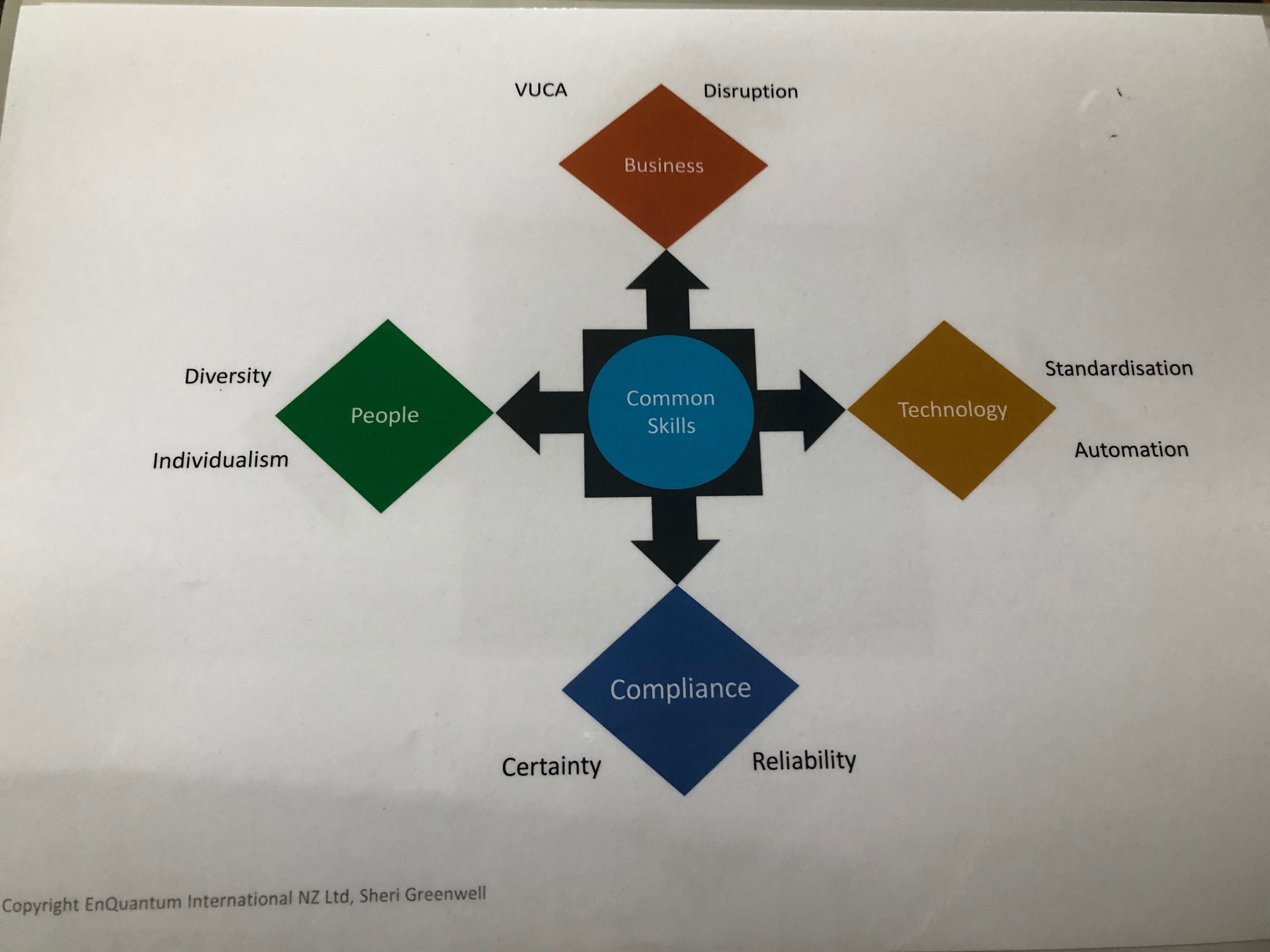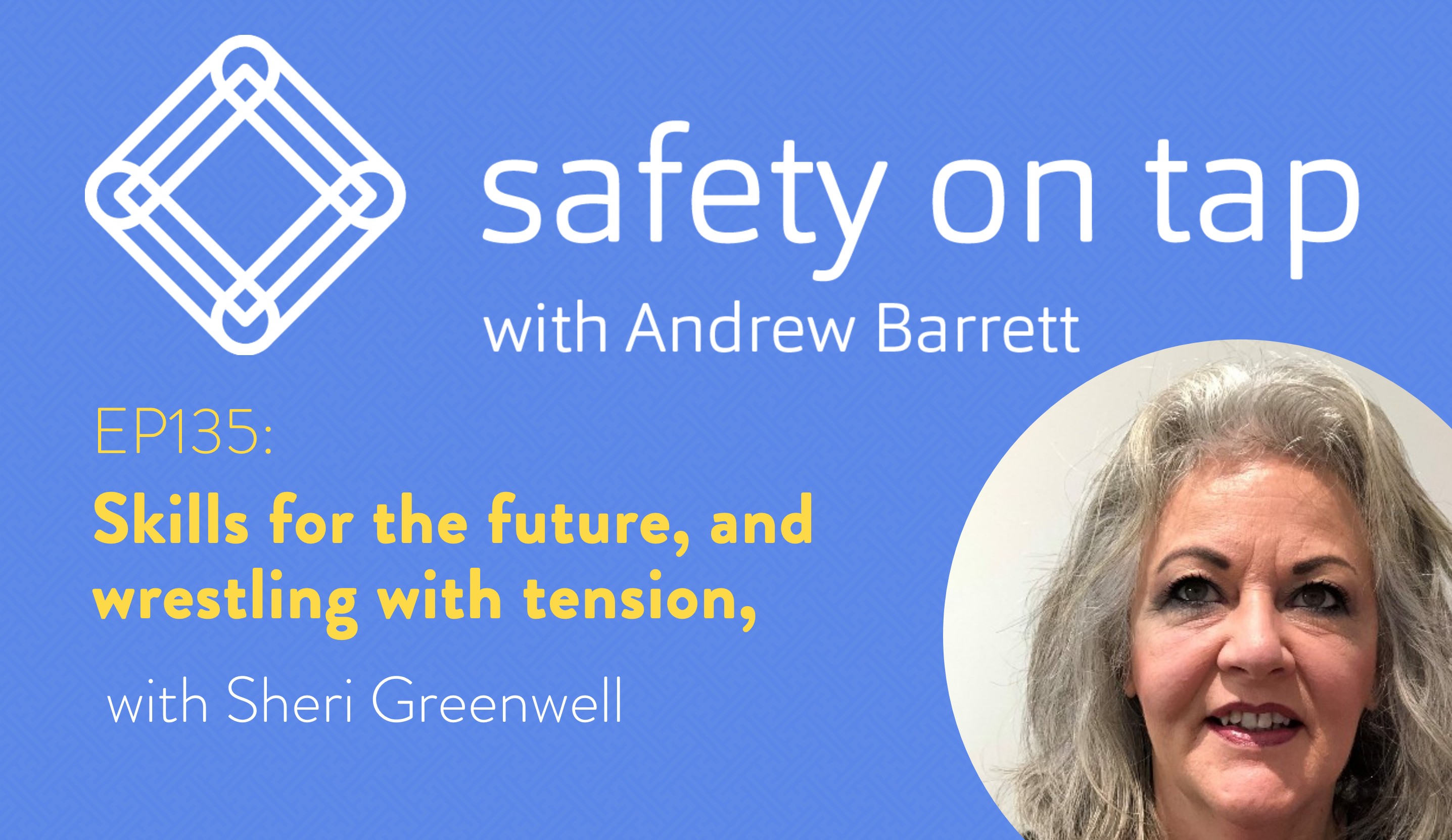Being future-ready and future-relevant means that we need different skills than what got us here. Not only that, today’s guest today sees tensions businesses experience between competing goals, tensions we need to see and wrestle with to be future-ready and future-relevant.
Hey, it’s Andrew, and this is Safety on Tap.
Since you’re listening in, you must be a leader wanting to grow yourself and drastically improve health and safety along the way. Welcome to you, you’re in the right place. If this is your first time listening in, thanks for joining us and well done for trying something different to improve! And of course, welcome back to all of you wonderful regular listeners.
My guest today is Sheri Greenwell, a health and safety leader and what I would call a neogeneralist. If you’re not familiar with the term, you’ll know what it’s referring to and probably will think of some people who fit the concept. It was coined by Kenneth Mikkelsen and Richard Martin.
In their book titled ‘The Neo-Generalist’, they say “The neo-generalist defies easy classification. They are tricksters who traverse multiple domains, living between categories and labels. Encompassing rather than rejecting, the neo-generalist is both specialist and generalist. A restless multidisciplinarian who is forever learning. They bring together diverse people, synthesising ideas and practice, addressing the big issues that confront us in order to shape a better future”
I’m not sure I can describe her any better, other than add some context to some of that multidisciplinaryness. Sheri is a degree qualified in chemistry, has a background in quality systems, and seems to have fallen in love with learning and development, but in a really open-boundary kind of way. A student of not just training but learning, her specialism extends to areas such as Neurolinguistic Programming. But it’s not all work, she dives deep into numerous cultural traditions quite distinct from her upbringing, and actively engaged in the arts including dancing.
Sheri is passionately engaged in health and safety which makes an impact, yet doesn’t fit the usual mould for health and safety professionals. Which is the very reason why she adds so much value?
Stick around after this chat, not only for my takeaways but I’ve got a special gift for those of you genuinely engaged in being future-ready and future-relevant.
Here’s Sheri:
I know that Sheri’s model is a very visual one, so instead of grappling with spoken words, I’ve included it below, and of course the visual learners can grab my personal hand-written notes of this episode, with the key points I made in all their visual glory, plus space for you to do your own reflection and action-planning.

Here are my three takeaways from that chat with Sheri Greenwell:
Takeaway #1: Tension exists. Without getting all philosophical on you, tension serves a really useful purpose to stave off entropy, or at the very least stagnancy. So the first takeaway is getting in tune with the tensions which are around you. Tensions sometimes manifest in conflict (between people, or goals, or resources). Tensions compete, there are winners and losers. And managing tensions requires trade-offs – when I’m coaching people I use the phrase YES=NO. Every yes means you are saying no to something else. How can you tune into and better understand the tensions around you?
Takeaway #2: The tensions Sheri has identified, between flexibility and compliance, and between people and technology, are real in my experience. What about you? That’s the takeaway on this point – have a think, ask around, discuss with your colleagues and your internal customers, do those tensions exist? How might tension between flexibility and compliance affect safety, good or bad? How does technology compete with people, or vice versa, and does this affect safety?
Takeaway #3: Skills for the future. Previous guests and Futurist Dave Wild (episode 66) talk about the best way to predict the future being to create it ourselves. This is the tension Sheri and I touched on between the technical skills defining our profession and the skills we’ll need to be both future-ready and future-relevant. I mentioned the Top 10 Skills required for 2020, as predicted by the World Economic Forum. How do you fare, on complex problem-solving? Critical thinking? Creativity? How future-ready are you, what do you need to do to be more future-ready?
On that note, I’m going to offer you something, to help you drastically improve this year.
Since the World Economic Forum has kindly predicted the Top 10 Skills required for 2020, and subsequently for 2022, would it be useful to see how you fare against these predictions and learn how you can take action to build on your strengths and work on your areas for improvement?
I am hosting the webinar on Future Skills for Safety Professionals. The webinar will be free, and I’ll be tailoring the content according to the audience, so be prepared to get involved in your own growth and development.
This is not a technical skills workshop – this is a Future Skills workshop! As previous guests and Futurist Dave Wild says, the best way to predict the future is to create it ourselves. In all the work I do coaching and developing safety leaders and teams, I know that a huge proportion of you struggle to be effective despite being technically competent. The most interesting thing about these Future Skills is that they are almost entirely ‘soft skills’, or to use a much better phrase that listener Hein Haveman put me onto, these are ‘power skills’.
This year is my year of the Ruthless Gentleman, which I shared with you in Episode 130. Ruthless with time, and gentle, caring, and generous with people. I don’t do many webinars but will be now. They are still ruthless with time, because the time both you and I invest in a webinar, will give you good returns, and of course, the entire webinar is premised on serving you, being generous for you, so it’s free!
I’m here to help you create your more effective future, and we’re doing this soon.
Register for this free webinar over at safetyontap.com/future-skills
I can’t wait to see you in the webinar room and work with you to build your power skills, your future skills, as you create your future now.
I mentioned in my introduction that Sheri doesn’t fit the usual mould for a health and safety professional, which is one of the tensions I hoped we could get to in that conversation but we ran out fo time. I’ve asked Sheri to come back to talk about this. The very tension is between the need for a defined profession, with rules and entry criteria and a defined body of knowledge, which makes it hard for people like Sheri to be recognised, and included. At the same time, we desperately need more people like Sheri working in health and safety, to broaden our sometimes narrow field of view. She’s keen to come back on in a little while and speak to that – two sides of the same coin – a challenge and an opportunity. Stay tuned for that one.
Thanks so much for listening. Until next time, what’s the one thing you’ll do to take positive, effective or rewarding action, to grow yourself, and drastically improve health and safety along the way? Seeya!
Here’s your FREE reflection worksheet from this episode.
And here’s your FREE download of the full transcript of this episode.
Feel free to share this with your team/colleagues!


Hello Dave,
This was an excellent conversation that resonated with me in many area.
1) Before I listen to it again/read the transcript to reflect/comment in detail, I was interested to hear your comment about what was being taught in university when you went through, the shelf-life of an MBA and the lack of attention by teaching institutions regarding the soft skills. Just having completed my OHS masters last year, I am happy to report that 2 of the management subjects dealt with the VUCA environment and encouraging diversity. This may be acknowledging thinking about the “soft skills”.
I feel this then leads to the issue of greater complexity adding to the tensions created in the areas of technology, people, compliance and business. It is here in the clutter of diversity that business is challenged and consequently the workers (at all levels) are suffering through increased workloads, shortening time-frames and increased scrutiny. This is certainly driving mental health issues in my industry. My observation is that ‘highly competent’ front-line supervisors that have high emotional intelligence are the most vulnerable in this environment. I have unfortunately seen supervisors suffer sever mental breakdowns, from which they have not been able to recover.
I am attempting to use Prof. Hollnagel’s FRAM to demonstrate the consequences of complexity from competing tension drivers and how this affects the worker and productivity. (work in progress).
2) On a slightly different note – will you be able to ‘bottle-up’ some of the ‘Future-skills’ webinar? I will be on the other side of the world and without access to the internet in March, therefore cannot participate at that time, but would like to access the learning that will be derived from the exercise.
Regards
Rob Kovacs (Traralgon – Victoria)
She is an amazing lady.
Hey Andrew & Sheri, loved the podcast, Sheri’s words make me think. “But if you have on the exact opposite end of that polarity compliance is trying to actually impose a lot of control, it’s seeking certainty. It’s imposing a lot of controls and a lot of requirements to lock everything down to have it certain. So trying to have certainty in an uncertain world is going to be a point of conflict.” I agree with this and see it often. As you both know I am questioning compliance and resonates with the idea of branding compliance separate to safety. But what I have learned is that the role of the safety pro or anyone in risk is to provide certainty. To assure that the business will be safeguarded from loss, of any kind. This is really what our roles are, we could argue and get philosophical about the morality question but in the end, it is about assurance. I find this is where safety people struggle. The inability to call to action, therefore, falling back on the big stick mentality. Also besides, there is a quest by many safety people to eliminate risk at all cost, often not backing the quest up with real data. I have recently started to explore the construction of riks statements. Adding to the power skills you talk of, I think it will pay for safety people to develop this skill. How to properly frame a risk statement, thereby motivating action for proportionate controls, assuring businesses of an assured continuous operation in a VUCA world.